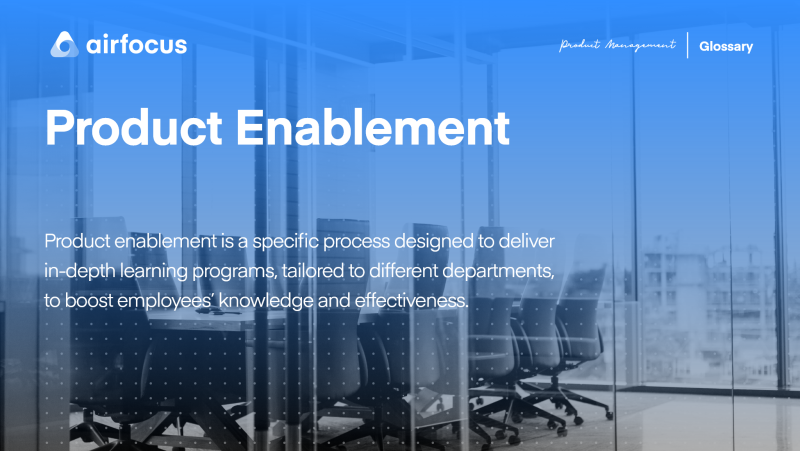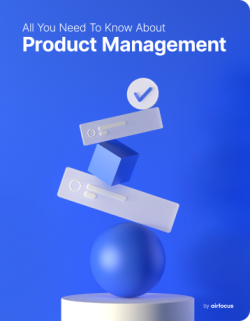Product Enablement
What is Product Enablement
Definition of Product Enablement
Product enablement is a specific process designed to deliver in-depth learning programs, tailored to different departments, to boost employees’ knowledge and effectiveness.
Product enablement is based on the assumption that the more employees understand products, the better their performance will be.
For example, product enablement for a customer support team would equip them with key details on a product’s purpose, capabilities, target customers, etc. This helps them treat customers to a higher standard of service than a team lacking functional product knowledge.
As a result, they could answer questions accurately and quickly, troubleshoot issues, walk customers through certain processes, and more.
Good communication and collaborative facilities are crucial for effective product enablement in any business. Each team must have the tools to deliver employee training and educational resources to the entire workforce, as required.
The term ‘product enablement’ is borrowed from ‘sales enablement' and the two are similar processes in theory. The key difference is that sales enablement is designed to increase the performance of the sales team specifically, whereas product enablement is a process the entire organization can go through.
The benefits of product enablement
The core benefit of product enablement is equipping employees with bespoke training on the products they’re required to work with. This may be in a customer-focused role (such as in a support department), in marketing, in logistics, or any other area in which knowledge of the company’s product proves advantageous.
Good product enablement ensures there’s a clear sense of the product’s concept, purpose, user personas, advantages over competitors’ goods, and more.
In this way, product enablement creates authentic company-wide alignment and minimizes the risk of misunderstanding or miscommunication.
What are some of the common challenges in product enablement?
The process of creating product enablement training in an organization can be incredibly complex, depending on the business and its product offering.
Goods of a highly-technical nature, for example, can be difficult to translate into learning material that is accessible to a non-technical employee. Indeed, those responsible for product enablement may even struggle to grasp the finer points of complex items themselves, which could become an obvious obstacle to their ability to educate others.
This is why it’s so crucial that those responsible for product enablement gain an in-depth understanding of the needs of various internal stakeholders, and translate that insight into training that resonates with different audiences.
When do you need product enablement?
Product enablement is critical for any company that’s preparing to release a product. Everyone involved in marketing, sales, or customer support should undergo training well before the product launch date, to ensure that the release it’s a success for both the business and its customers.
But product enablement can be included as part of a wider education program within your company, too, such as updating on revised policies or goals.
The key is to make all training and resources as accessible as can be: employees should be able to grasp concepts and insights quickly. Especially when they’re interacting with customers or other businesses and need to provide answers quickly.
Educational resources created for employees across different departments should relate to their work only. There’s no sense in producing a generic training program or materials for the entire business.
Keep it specific. Keep it relevant. Keep it effective.
How to lead product enablement
Product enablement is a newer process, so how you undertake it will vary based on your organization’s needs and goals. Here are a few tips to help you get started.
Involve different departments
Different departments within your organization will have different understandings of the product your company has created. It's a good idea to involve different departments whenever you're creating documents for your product.
This way, you'll be able to produce a more well-rounded vision for your product, allowing your customers to better understand what you're creating.
Survey teams to understand product awareness
You’d be surprised how many well-known companies have teams that don’t know much about some of their flagship products. To ensure you’re not in the same boat, survey your different teams to gauge how well they know your product. Maybe they’re working with old information, are new to the company and aren’t yet up to speed on your product portfolio, or are unaware of your product’s latest features. In any case, it’s important to understand what they know and what they don’t so you can better design your product enablement process.
Encourage communication
If you’re involving different departments in product enablement, it’s also essential that they communicate properly. Different departments can often become siloed and work independently, but this can start to break down the broader understanding of the product you're producing.
You can ensure that everyone shares your product vision by facilitating and encouraging regular communication through meetings or increased collaboration on projects.
Get to know the 4 P's of product enablement
Positioning - Each department within your organization will have unique opportunities to position your product. Every department should know your product's unique value and how to communicate that value.
Pitch - The best way to pitch a product across your organization is to focus on its benefits, not just its features.
Play - It’s important that employees get to experience products first-hand — not just through documentation. Giving hands-on opportunities to “play” with your product is key.
Program - Have a program in place that details how and when to offer which products to your customers based on their unique needs.
Product enablement tips for remote employees
Keep essential documents updated
First, you can help remote employees with product enablement by updating essential documents regularly. This will help them always have accurate, updated information that might come more easily to in-office staff.
Create remote-friendly training courses
Remote-friendly training courses can be a great way to involve remote employees, ensuring that even though they aren't in the office regularly, they will still have access to product enablement skills.
Get feedback from remote employees
Collecting feedback from remote employees is essential when it comes to product enablement. By finding out what is and isn't working for remote workers, you'll be able to best support them and choose an approach that works for everyone.

General FAQ

Glossary categories
Experience the new way of doing product management

Experience the new way of doing product management








